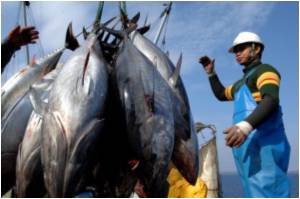
Fathead minnows -- "pimephales promelas" -- were exposed to atrazine at the USGS Columbia Environmental Research Center in Columbia, Missouri. Experts then tracked egg production, tissue abnormalities and hormone levels.
Researchers exposed the fish to concentrations from 0-50 micrograms per liter of atrazine for up to 30 days; testing levels were all below the USEPA (US Environmental Protection Agency) Office of Pesticides Aquatic Life Benchmark of 65 micrograms per liter for chronic exposure of fish, they said.
"Thus, substantial reproductive effects were observed in this study at concentrations below the USEPA water-quality guideline," researchers concluded.
And "the reproductive effects observed in this study warrant further investigation and evaluation of the potential risks posed by atrazine, particularly in wild populations of fish from streams in agricultural areas with high use of this herbicide," Tillitt stressed.
The weed-killer is used on most corn, sugarcane and sorghum acreage in the United States.
Advertisement
TAN













